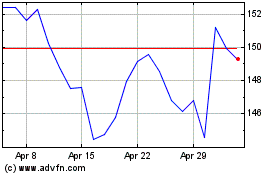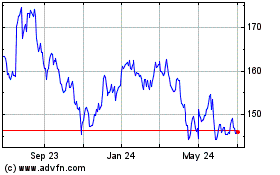By Jonathan D. Rockoff and Sara Randazzo
This article is being republished as part of our daily
reproduction of WSJ.com articles that also appeared in the U.S.
print edition of The Wall Street Journal (December 18, 2018).
Johnson & Johnson faced continued concerns on Wall Street
about the threat posed by lawsuits over the safety of the company's
signature baby powder.
Shares fell 2.9% Monday, after dropping 10% Friday following
news reports saying J&J knew for years some of its talcum
powder contained asbestos. The slide continued even though J&J
mounted an aggressive counterattack, including taking out full-page
newspaper ads.
The plunge, which has cut J&J's market capitalization by
$50.2 billion, illustrates the risk companies take fighting
litigation tooth-and-nail, rather than settling. Companies
sometimes calculate it is better to resolve sprawling litigation
with one payout rather than face the expense and reputational
damage of taking dozens of cases to trial.
J&J executives and lawyers have long insisted the signature
powder is safe and asbestos-free. Settling would set a "really bad
precedent when the science and facts [are] on our side," Chief
Financial Officer Joseph Wolk said in an interview Monday.
Any acknowledgment that the powder isn't safe could imperil not
just sales but the entire company's image, marketing experts say.
The Johnson's franchise of soaps, shampoos and powders is one of
the few brands to use the company's name. It rings up about $1.5
billion in annual sales.
Several analysts have minimized concerns about the lawsuits'
potential financial impact. But the downside to J&J's steadfast
defense has been repeated legal and public-relations hits.
"You're taking a product you used to associate with good health
or being clean, and all of a sudden, you associate it with cancer,"
said Witold Henisz, a management professor at the University of
Pennsylvania's Wharton School.
Several juries have ruled against the company in the 18 cases to
go to trial in recent years, including a jury in St. Louis that in
July awarded $4.7 billion in damages to 22 women and their families
who blamed ovarian-cancer cases on asbestos in the baby powder.
J&J has appealed the verdict, and other judgments against
it.
Imerys SA, which supplied the talc in the powder at issue in the
St. Louis case and was also named as a defendant, had agreed to
settle before the trial began for an undisclosed amount.
"Imerys Talc America is committed to the quality and safety of
its products, as evidenced by our quality testing results that
consistently show no asbestos," the company said in a statement
following the settlement.
J&J appeals have resulted in verdicts reversed, and the
company has also won several trials while others ended in
mistrials.
The overall record has persuaded the company and its lawyers
that its aggressive defense is the right approach, according to Mr.
Wolk. He said he expected J&J shares to regain value lost as
investors refocus on the company's fundamentals. "We will recover
from this recent downturn," he said.
The plaintiffs' strategy has shifted as the litigation has
evolved. Earlier trials claimed Johnson's talcum powder itself
caused ovarian cancer. In more recent cases, plaintiffs allege
asbestos in the powder is to blame for mesothelioma, as well as for
ovarian cancer.
The company said in a recent earnings report it faces 11,700
claims over its talcum-based body powders.
In dispute between the plaintiffs and J&J is whether the
talcum powder actually contained asbestos and if it did, how that
would cause a life-threatening disease. Plaintiffs' lawyers contend
J&J had evidence that the powder could be harmful but hid those
revelations from the public.
The American Cancer Society says some talc contains asbestos, a
carcinogen, in its natural form, but that talc-based cosmetics
products are supposed to be free of asbestos. Studies of talcum
powder not focused on asbestos have found a small increase in risk
of ovarian cancer if any risk at all, according to the
organization.
The recent stock hit, J&J's worst two-day stretch since
2002, came after Reuters and then the New York Times reported the
company knew testing from the 1970s to early 2000s sometimes found
asbestos tainted its talc but failed to alert regulators or the
public.
J&J says thousands of tests conducted by the company, health
regulators and outside labs found the talc used in the baby powder
was asbestos-free, and the company behaved appropriately.
J&J has sought to counter the articles. Ahead of their
publication, the company established a website --
www.factsabouttalc.com.
Since Friday, Mr. Wolk and CEO Alex Gorsky have reached out to
top investors to offer reassurance. "We don't see these folks
selling," Mr. Wolk said of the investors.
J&J said after Monday's market close that its board had
authorized the repurchase of up to $5 billion in shares.
Write to Jonathan D. Rockoff at Jonathan.Rockoff@wsj.com and
Sara Randazzo at sara.randazzo@wsj.com
(END) Dow Jones Newswires
December 18, 2018 02:47 ET (07:47 GMT)
Copyright (c) 2018 Dow Jones & Company, Inc.
Johnson and Johnson (NYSE:JNJ)
Historical Stock Chart
From Mar 2024 to Apr 2024

Johnson and Johnson (NYSE:JNJ)
Historical Stock Chart
From Apr 2023 to Apr 2024
